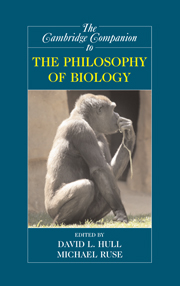Book contents
- Frontmatter
- 1 Adaptation
- 2 Population Genetics
- 3 Units and Levels of Selection
- 4 What’s Wrong with the Emergentist Statistical Interpretation of Natural Selection and Random Drift?
- 5 Gene
- 6 Information in Biology
- 7 Reductionism (and Antireductionism) in Biology
- 8 Mechanisms and Models
- 9 Teleology
- 10 Macroevolution, Minimalism, and the Radiation of the Animals
- 11 Philosophy and Phylogenetics: Historical and Current Connections
- 12 Human Evolution: The Three Grand Challenges of Human Biology
- 13 Varieties of Evolutionary Psychology
- 14 Neurobiology
- 15 Biological Explanations of Human Sexuality: The Genetic Basis of Sexual Orientation
- 16 Game Theory in Evolutionary Biology
- 17 What Is an ‘Embryo’ and How Do We Know?
- 18 Evolutionary Developmental Biology
- 19 Molecular and Systems Biology and Bioethics
- 20 Ecology
- 21 From Ecological Diversity to Biodiversity
- 22 Biology and Religion
- 23 The Moral Grammar of Narratives in History of Biology: The Case of Haeckel and Nazi Biology
- Reference List
- Index
- Series List
15 - Biological Explanations of Human Sexuality: The Genetic Basis of Sexual Orientation
Published online by Cambridge University Press: 28 April 2008
- Frontmatter
- 1 Adaptation
- 2 Population Genetics
- 3 Units and Levels of Selection
- 4 What’s Wrong with the Emergentist Statistical Interpretation of Natural Selection and Random Drift?
- 5 Gene
- 6 Information in Biology
- 7 Reductionism (and Antireductionism) in Biology
- 8 Mechanisms and Models
- 9 Teleology
- 10 Macroevolution, Minimalism, and the Radiation of the Animals
- 11 Philosophy and Phylogenetics: Historical and Current Connections
- 12 Human Evolution: The Three Grand Challenges of Human Biology
- 13 Varieties of Evolutionary Psychology
- 14 Neurobiology
- 15 Biological Explanations of Human Sexuality: The Genetic Basis of Sexual Orientation
- 16 Game Theory in Evolutionary Biology
- 17 What Is an ‘Embryo’ and How Do We Know?
- 18 Evolutionary Developmental Biology
- 19 Molecular and Systems Biology and Bioethics
- 20 Ecology
- 21 From Ecological Diversity to Biodiversity
- 22 Biology and Religion
- 23 The Moral Grammar of Narratives in History of Biology: The Case of Haeckel and Nazi Biology
- Reference List
- Index
- Series List
Summary
“Do genes make people gay?” This is a question scientists who study human sexuality hear all the time from politicians, students, and people just curious about their own sexual orientation. Many people believe that the causation of sexual orientation has important implications for the moral status of homosexuality. Both common sense and moral theory tend to evaluate the acceptability of a person's behavior on the basis of the controllability of that behavior. One cannot be held morally blameworthy for things over which one has no control. Because individuals have no control over the genes they inherit, according to this theory they should not be held responsible for being gay if it is genetically determined. This view is apparent in surveys of Americans that have found an association between the belief that homosexuality is genetically determined and less negative attitudes towards gay people (Schmalz 1993, Tygart 2000).
The purposes of this essay are to review what the best science currently available says about the genetic causes of sexual orientation and to discuss some of the normative implications and, more importantly, nonimplications of that science. As with any issue in which there is substantial political and scientific controversy, there is ongoing debate about the very distinctions that lie at its foundation. Nevertheless, terms like “heterosexual” and “gay” are commonplace in both the popular and the scientific literature.
- Type
- Chapter
- Information
- The Cambridge Companion to the Philosophy of Biology , pp. 291 - 303Publisher: Cambridge University PressPrint publication year: 2007

